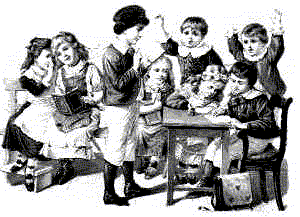top of page
6(h). The School Treat
Geoff and Marilyn Bush

The following report from ‘The Bournemouth Parish Magazine’ of August 1869 is titled ‘The School Treat’ and describes a somewhat idyllic summer’s day spent at Hinton Admiral House. It is fairly easy to imagine the scenes of excitement in those days long before computer games, television and ‘Castlepoint’ :
"Tuesday last will long be remembered, we should imagine, by many of our young friends in Bournemouth, Moordown and Pokesdown, as one of the most enjoyable days they have spent for a very long time indeed. Judging from the numbers assembled, and the early hour at which they met, we might well gather that the prospect of a ride in the waggons, and the pleasure in store for them, must have occupied a large share of their thoughts for some time previous. It was thought advisable that only the elder children should be permitted to avail themselves of the kind invitation extended by Sir George and Lady Gervis, to spend the day at Hinton Admiral, and therefore it was arranged that those under seven years of age should be entertained separately at their respective parishes; still even with this limitation it was found that the numbers of those qualified to go were so considerable that no fewer than seven waggons were needed to convey the scholars from Bournemouth and Moordown alone. These were most kindly placed at our disposal by Mr R. Seare, of Muscliffe; Mr D. Burt of Moordown; Mr Cox of Malmesbury Farm; and Mr Hayter of Bournemouth.
A start was effected from Bournemouth a little before ten o’clock, and Hinton Admiral reached shortly after noon, no mishap occurring during the progress worthy of record, or in any way interfering to check the high spirits of those who were being conveyed. On arriving at the gates of the Park a procession was formed, and headed by the band we marched up in grand style to the house, music playing and banners flying. We were not left long before the bugle sounded, summoning us to dinner, to which we sat down in number about 340, including about thirty children from Christchurch, and an equal number from the village school. The long drive added a keen relish to our appetites, and ample justice was done to the excellent repast provided.
Dinner ended, the afternoon was spent in a most delightful manner. There were races for the boys, and races for the girls, cricket matches, sack jumping, and games without end, as well as prizes and presents for almost everyone. In short every one was quite surprised how quickly the time had passed, when the bugle again sounded for tea, and we all repaired once more to the beautiful avenue in which the tables had been spread. Tea over, we adjourned to the park, where several fire balloons were sent up with great success. It was about 7 o’clock when the entertainments were brought to a close, and the National Anthem having been sung, three hearty cheers were given for Sir George and Lady Gervis, after which we wended our way homewards, having spent a very happy day.
Next day the infant children of S. John in the Wilderness, Moordown, were regaled with tea and cake to the number of seventy, in a field belonging to the farm occupied by Mr. R. Seare, of Muscliffe, and on Thursday the infant children of S. S. Michael and Clement’s schools were entertained in the meadow near the Sanatorium, where they enjoyed themselves thoroughly.”

Hinton House
The winter of 1890-91 was a very long and hard one and the Christchurch Times reported the progress of the bad weather over several months. The cold weather began in November with severe frost and a fall of snow, which continued through December.
The roads were icy and dangerous, so travel was better avoided if possible. Mr and Mrs Meyrick, the son and daughter-in-law of Sir George Meyrick of Hinton Admiral, took to travelling in a Russian sleigh pulled by a horse complete with a red plume on its head and numerous bells on its harness. This was fine until one day the horse stumbled while pulling the sleigh near the “Cat and Fiddle” at Hinton . The passengers, the Misses Meyrick, were thrown out and the shafts of the sleigh were broken. Luckily no-one had any serious injury.
In January the frosts continued and the rivers froze over, preventing the Wick ferry from operating but allowing skating at the Quay. Mrs Willett Adye allowed the lake at Somerford Grange to be used for skating and after dusk the lake was illuminated by fancy lanterns. There was even a fete on the ice.
The severe weather created a great deal of hardship as people were unable to work due to the conditions. A Distress Fund was set up to which many people subscribed, raising £112. 9s. 10d. This money was used to assist 143 families in need, providing vouchers for bread, groceries and coal.
A thaw set in during February and there were hopes that the worst of the winter was over. This optimism was misplaced, as a big storm hit the area in March, with snow and strong winds causing drifts several feet thick. Further snow fell on subsequent days and roads were blocked. Sopley was completely cut off, fifty men worked to clear a passage out of the village. The snow lasted until the end of the month before warmer weather arrived and ushered in a belated but very welcome Spring.
bottom of page

